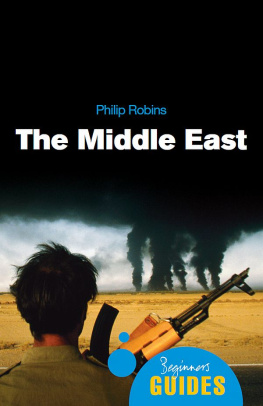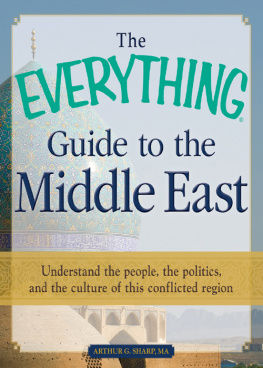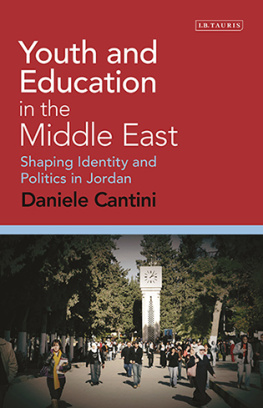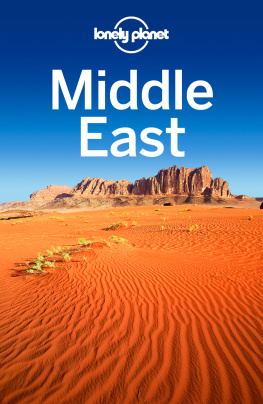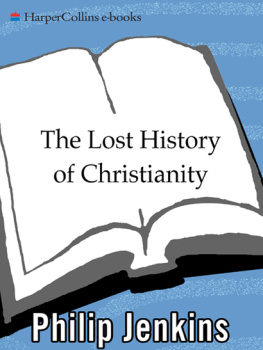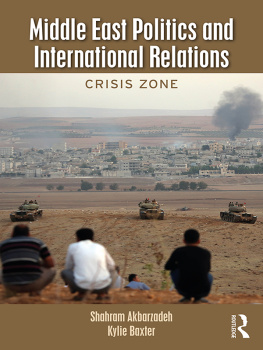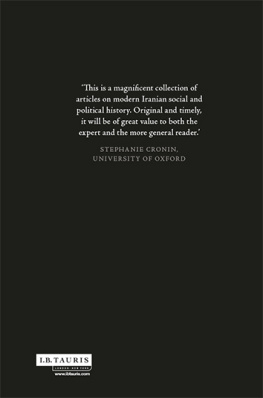The Middle East
A Beginners Guide
ONEWORLD BEGINNER S GUIDES combine an original, inventive, and engaging approach with expert analysis on subjects ranging from art and history to religion and politics, and everything in between. Innovative and affordable, books in the series are perfect for anyone curious about the way the world works and the big ideas of our time.
anarchism | forensic science |
artificial intelligence | french revolution |
the beat generation | history of science |
biodiversity | humanism |
bioterror & biowarfare | islamic philosophy |
the brain | journalism |
the buddha | lacan |
censorship | life in the universe |
christianity | machiavelli |
civil liberties | mafia & organized crime |
classical music | marx |
cloning | medieval philosophy |
cold war | middle east |
crimes against humanity | NATO |
criminal psychology | oil |
critical thinking | the palestineisraeli conflict |
daoism | philosophy of mind |
democracy | philosophy of religion |
dyslexia | philosophy of science |
energy | postmodernism |
engineering | psychology |
evolution | quantum physics |
evolutionary psychology | the quran |
existentialism | racism |
fair trade | the small arms trade |
feminism | sufism |

The Middle East
A Beginners Guide
Philip Robins

A Oneworld Paperback Original
Published by Oneworld Publications 2009
Reprinted 2010
This ebook edition published by Oneworld Publications 2011
Copyright Philip Robins 2009
The moral right of Philip Robins to be identified as the Author
of this work has been asserted by him in accordance with
the Copyright, Designs and Patents Act 1988
All rights reserved
Copyright under Berne Convention
A CIP record for this title is available
from the British Library
ISBN 978178074061-4
Typeset by Jayvee, Trivandrum, India
Cover design by Simon McFadden
Oneworld Publications
185 Banbury Road
Oxford OX2 7AR
England
Learn more about Oneworld. Join our mailing list to find out about our latest titles and special offers at:
www.oneworld-publications.com
For my son, Edmund
Acknowledgements
This book is the distillation of fourteen years teaching Middle East politics and society to undergraduate and Masters students at the University of Oxford. Though this may seem like an improbable cohort with which to develop the parameters of a beginners guide, in fact at the outset the vast majority of my students were indeed beginners as far as the study of the region is concerned. Yes, they were inquisitive and intelligent beginners, but beginners nevertheless. With very many young people in the West today they share a desire to understand the Middle East, without having had the opportunity to do so before entering higher education. My first words of gratitude must therefore be to the 450 or so graduates of these elective options, who shared their thoughts and their questions and were good enough to listen to my responses.
More broadly, I have been studying, researching and experiencing the Middle East for some thirty-three years. My first visit to the region, to Israel and Palestine, took place in 1976. Since then I have travelled to the region many times, frequently visiting most of its countries, and residing in the region on three occasions. My second word of gratitude must therefore be to the many people of the region, young and old, great and modest, whom I have come into contact with over the years, and who have helped me to develop my ideas about the region. Space precludes even an inadequate attempt to mention some of them by name. I still have much to learn, as do experts and beginners alike. In order to do so there can be no substitute for going to the region and engaging its people in conversation.
Third, I must thank those who have had a special impact upon my career in relation to the Middle East. These include those who have formally taught and substantively assessed my work: the late Nazih Ayubi, David Pool; my doctoral supervisor, Tim Niblock; and Roger Owen. My peers in the current generation of social scientists and modern historians working on the region, with whom I grew up and shared learning and lighter moments: Ali Ansari, Toby Dodge, Mick Dumper, Anoush Ehteshami, Haifaa Jawad, Paul Lalor, Beverly Milton-Edwards, Emma Murphy, Gerd Nonneman, Joel Peters, Richard Schofield, Kirsten Schulze, Claire Spencer and Charles Tripp. And those from the region based in the UK, notably the members of the Holland Park Group, with whom I have had countless debates and discussions over the years, and who have so patiently answered my questions, particularly: Hussein Agha, Mustafa Alani, Hussein Aslan, Saad Djebbar, Jasin Kaplan and Ahmad Khalidi.
I must thank all of my current and past colleagues in Oxford for their congenial company and intellectual stimulation, especially as far as the Middle East is concerned. In particular, I must mention Louise Fawcett, Jim Piscatori (now in sunnier climes) and Michael Willis, and a clutch of thoughtful and dedicated doctoral students, with whom I have shared the task of teaching Middle East Politics over the years. Among colleagues, a special thank you is in order to Ahmed al-Shahi, who read and commented on some of this manuscript. Needless to say the responsibility for the final version of the book is my own.
Lastly, I want to thank the staff of Oneworld for their help and assistance in bringing the idea for a Beginners Guide on the Middle East to fruition. I must single Mike Harpley out for special thanks. This guide was his idea. He has pursued it, and me, with quiet determination, a constructive attitude and an amiable disposition. Most importantly, he has worked hard to keep both the extravagances of style and substance in check, a contribution for which I am immensely grateful. I must also thank an anonymous reader, for scrutinizing the whole of the first draft and for making a range of helpful comments and suggestions that I have been happy to take on board.

